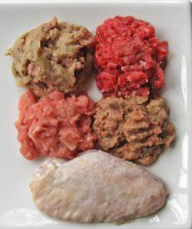The Big Decision
What Should You Be Feeding Your Cat?
All cats, small or large, are true carnivores.
This means they must eat meat to survive. Cats cannot be vegetarians. Because they evolved to fill this top predator niche, their bodies are specifically geared for processing a raw, prey-based diet. This is as true for a tiger as it is for the cat on your lap.
In the wild, cats eat whole, raw prey.
This diet includes mice and any other small rodents available, rabbits, insects, amphibians and birds. Their systems are uniquely set up to metabolize this diet which is high in moisture, high in protein and very low in carbohydrates. Cats have short, acidic, naturally pathogen resistant digestive systems, which are highly efficient at metabolizing a raw diet of meat, organs and bone. Cooking degrades the nutrients in meat, making them less available to your cat and renders bone indigestible and dangerous.
Cats have relied on this diet for thousands of years.
Felines have lost the ability to process carbohydrates very well. Excess carbohydrates in the diet, especially grains, can lead to obesity, diabetes and serious digestive problems. Cats get most of their energy requirements from glucose their livers process from protein, not carbohydrates. Cats evolved as desert creatures, so they naturally have a low thirst drive. Cats that are fed a dry, kibble diet risk being chronically dehydrated, increasing the risk of urinary and kidney problems. Dry foods are about 10% moisture and even with the water they drink, cats on a dry diet only get about half the liquid of a cat on a canned or raw diet that has a 60-70% moisture content.
Feed your cat a biologically appropriate, natural diet.
A diet that fits her true nutritional requirements. The benefits to your cat are enormous. And it isn’t hard at all. Raw diets can be readily purchased frozen at enlightened retail stores, purchased online and delivered right to your door, or if you are a do-it-yourselfer, be made at home.
Get the details.
For more information, visit Feline Nutrition. If you are new to feeding a raw diet or have been using raw diets for years, we have a wealth of science-backed information on feline health and nutrition.

The many benefits of a raw diet:
- Improved digestion
- Greatly reduced stool, odor and volume
- Healthy coat, less shedding and fewer hairballs
- Increased energy
- Weight loss, if overweight
- Better dental health
- Better urinary health
I am text block. Click edit button to change this text. Lorem ipsum dolor sit amet, consectetur adipiscing elit. Ut elit tellus, luctus nec ullamcorper mattis, pulvinar dapibus leo.
I am text block. Click edit button to change this text. Lorem ipsum dolor sit amet, consectetur adipiscing elit. Ut elit tellus, luctus nec ullamcorper mattis, pulvinar dapibus leo.

